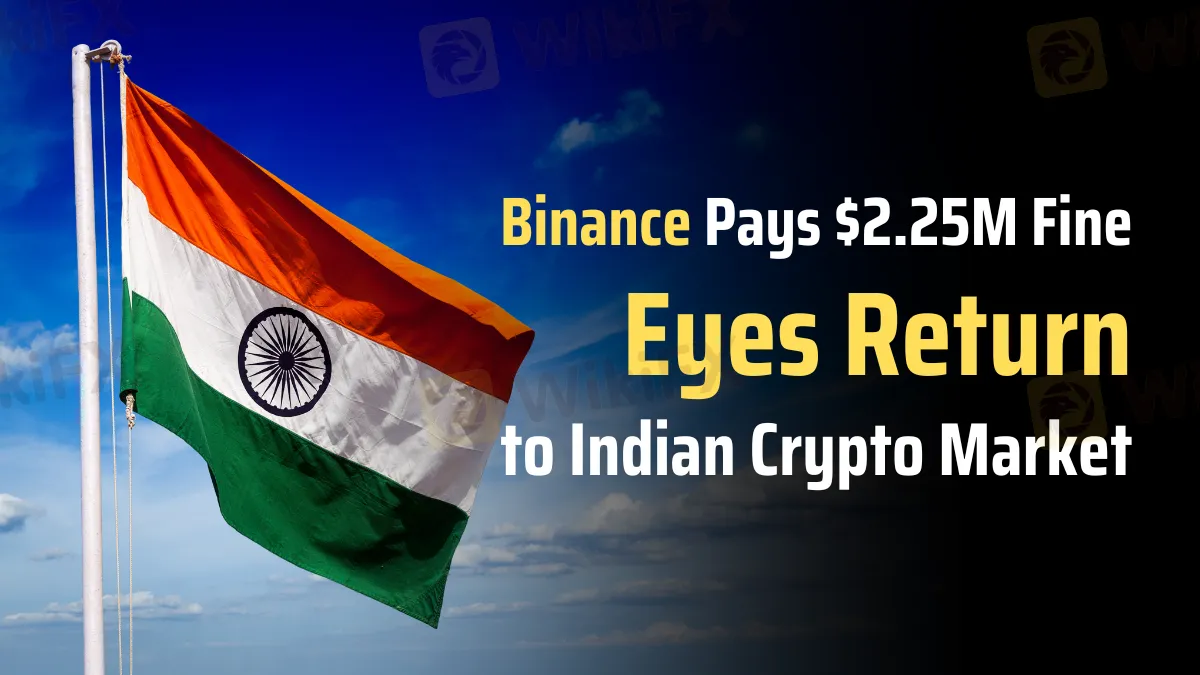简体中文
繁體中文
English
Pусский
日本語
ภาษาไทย
Tiếng Việt
Bahasa Indonesia
Español
हिन्दी
Filippiiniläinen
Français
Deutsch
Português
Türkçe
한국어
العربية
Binance Pays $2.25M Fine, Eyes Return to Indian Crypto Market
Abstract:Binance fined $2.25M by India's FIU for AML violations, seeks re-entry into the Indian market after a regulatory overhaul.

Binance, the world's biggest cryptocurrency exchange by trading volume, is preparing to re-enter the Indian market after being fined 188.2 million rupees (about $2.25 million) by India's Financial Intelligence Unit (FIU). The penalties were levied in response to breaches of India's anti-money laundering (AML) legislation.
In December of last year, the Indian FIU barred access to Binance and eight other international Bitcoin exchanges. This action compelled technology behemoths Apple and Google to ban local access to these exchanges from their app stores. Under Indian law, bitcoin exchanges must register with the FIU as reporting organizations and follow local AML laws. This includes withholding tax on cryptocurrency transactions and earnings.
Binance, which had made no formal comments on its re-entry, apparently intended to resume operations in India by paying the imposed penalty. In May, the exchange finalized its registration with the FIU, which was a critical step for restarting business in the nation. Among the other banned exchanges, the Seychelles-based KuCoin was the quickest to comply with Indian rules, paying a 3.45 million rupee penalty within a month after the crackdown.

The Indian fine is not an unusual event for Binance. The exchange has experienced worldwide regulatory problems. In May, Binance was fined $4.38 million by Canada's anti-money laundering agency for breaking local AML regulations. Binance contested the penalties, claiming that it did not target Canadian citizens. Coincidentally, the exchange has declared intentions to quit the Canadian market in May 2023.
Binance's regulatory issues are particularly severe in the United States. The exchange settled with the Justice Department for $4.3 billion and paid an extra $2.85 billion to the US commodities regulator. Changpeng Zhao, former CEO, pleaded guilty to breaking the Bank Secrecy Act and received a four-month prison term. Binance.US, the US subsidiary, has lost its money-transmitting license in seven states and halted new onboarding in Connecticut, Georgia, Ohio, Minnesota, and Washington.
Read more:
As Binance navigates these legal obstacles, re-entering India is a crucial step in its ambitions to stabilize and grow its worldwide business. However, it is unclear when the exchange will restart services in the nation.
Explore WikiFX for in-depth information about global cryptocurrency exchanges such as Binance. Make educated trading choices by reviewing thorough regulatory information, user reviews, and market research. Stay up to speed with WikiFX to traverse the ever-changing universe of digital assets with security and confidence.

Disclaimer:
The views in this article only represent the author's personal views, and do not constitute investment advice on this platform. This platform does not guarantee the accuracy, completeness and timeliness of the information in the article, and will not be liable for any loss caused by the use of or reliance on the information in the article.
Read more

Coinbase Under Scrutiny Amid Wrapped Bitcoin Delisting Controversy
Coinbase has come under fire after announcing its decision to delist Wrapped Bitcoin (wBTC), a move critics claim could be driven by competitive interests. The delisting, set to take effect on 19 December, has sparked allegations of market manipulation and concerns about fairness in the cryptocurrency ecosystem.

Solana Soars to All-Time High, Hits $264 on Coinbase
Solana hits $264 on Coinbase, breaking its 3-year high with an 11% daily surge. Learn what’s driving SOL's meteoric rise and the crypto market rally.

Mastercard Partners with JPMorgan for B2B Cross-Border Payments
Mastercard and JPMorgan's Kinexys Digital Payments join forces to enhance B2B cross-border payments, promising faster settlements and greater transparency.

Bitcoin Nears $100,000: A Triumph of Optimism or a Warning Sign?
Bitcoin’s meteoric rise continues to capture global attention as its price recently surpassed the $99,000 mark, briefly approaching the $100,000 milestone. This unprecedented rally has led market sentiment to reach a state of “extreme greed,” according to the Fear and Greed Index. Analysts suggest that the market may be entering overheated territory, raising questions about sustainability amidst ongoing enthusiasm.
WikiFX Broker
Latest News
Webull Partners with Coinbase to Offer Crypto Futures
eToro Expands Nationwide Access with New York Launch
Why Is UK Inflation Rising Again Despite Recent Lows?
Hackers Charged for $11M Crypto Theft Using SIM-Swaps
Role of Central Banks in the FX Market
FCA Alerts Against Sydney FX
What Makes Cross-Border Payments Easier Than Ever?
Trader Exposes Unethical Practices by STP Trading
Interactive Brokers Launches Tax-Friendly PEA Accounts in France
Google Warns of New Deepfake Scams and Crypto Fraud
Currency Calculator



